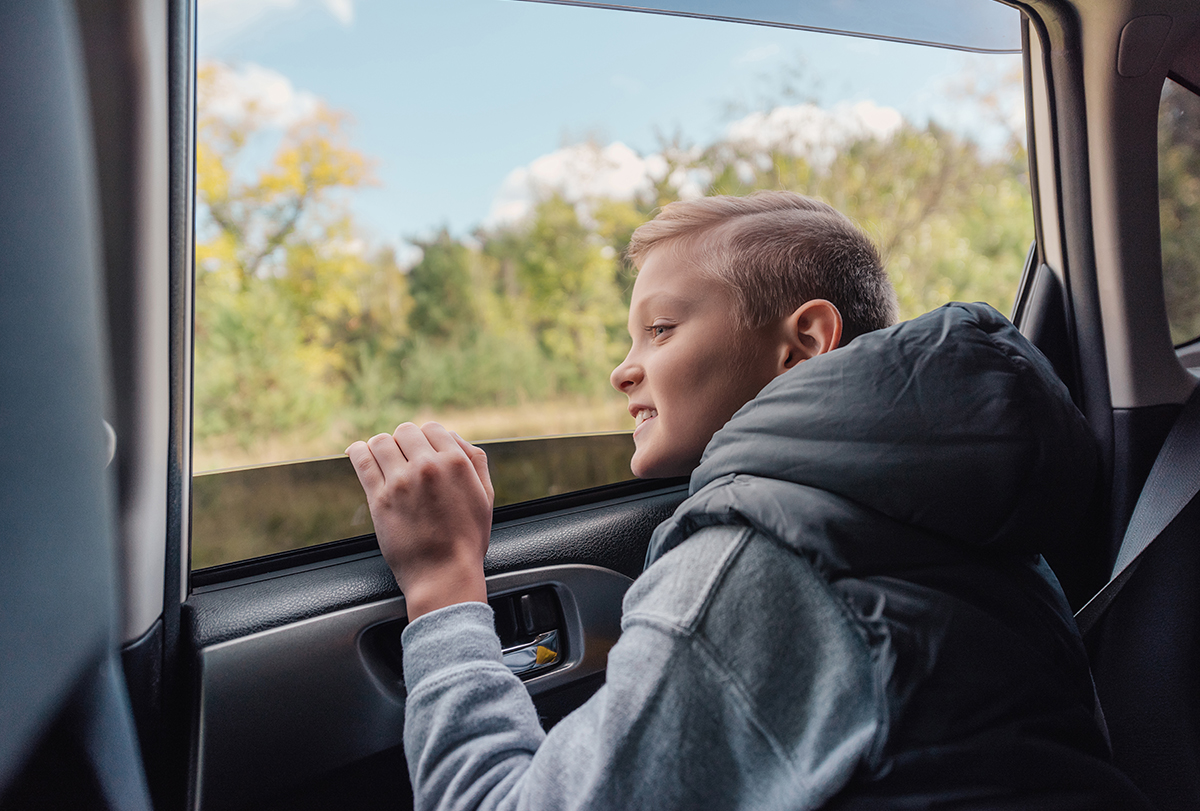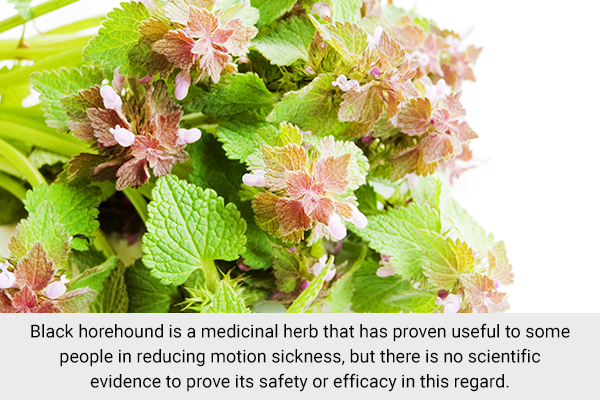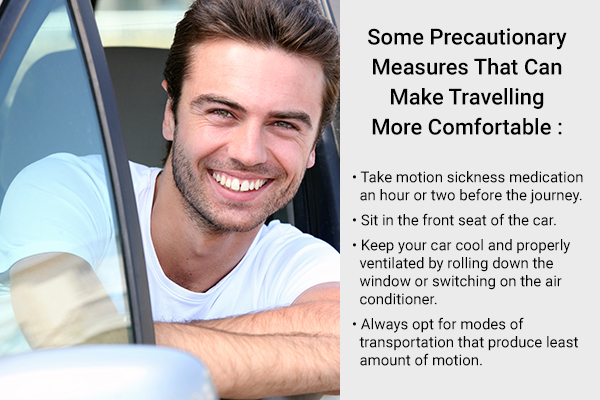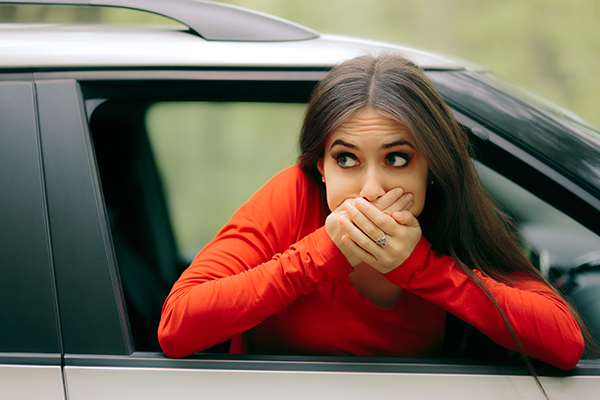In this article:
Motion sickness, or kinetosis, is a feeling of illness or uneasiness triggered by real or perceived movement.

People mostly experience it while traveling by car, ship, buses, train, or plane, but amusement park rides can bring it on as well. Watching other people or things move repeatedly such as in video games or virtual simulations can also cause motion sickness. (1)
This common but complicated syndrome is primarily the result of vestibular dysfunction that disturbs your body balance, but it also involves your autonomic nervous and digestive systems.
Motion sickness is characterized by a variety of discomforting symptoms such as nausea, vomiting, cold sweats, wooziness, headache, and irritability that come on suddenly and can last for hours. (2)
Remedies for Motion Sickness
Here are some natural ingredients that can help alleviate motion sickness.
1. Consume ginger
Ginger is often used as an alternative medicine for motion sickness. (3) It works as a natural antiemetic (preventing vomiting) to relieve nausea and vomiting.
Consuming reasonable amounts of ginger is unlikely to cause any adverse side effects, but some people may experience heartburn or acidity if it is taken on an empty stomach. So, it’s best to club it with a little food.
How to use:
- Chew a piece of raw ginger before setting out on your journey, and carry some with you in case you feel nauseous later.
- Consume 1 gram of ginger powder or 1–2 ml of ginger tincture about 30–60 minutes before your journey, and keep taking the same dose every 2–4 hours while traveling. (4)
2. Use black horehound

Black horehound is a medicinal herb that has proven useful to some people in reducing motion sickness, but there is no scientific evidence to prove its safety or efficacy in this regard.
Note: Black horehound is considered unsafe for patients with Parkinson’s disease or schizophrenia as it may interact negatively with their medications. (5)
3. Try using peppermint
Peppermint may help ease motion sickness. It has a refreshing aroma and cool minty flavor that can soothe your senses and calm the gut.
How to use:
- Pop a mint in your mouth while traveling.
- Carry a thermos of peppermint tea with you while traveling, and drink it if you start to feel uneasy. (6)
- Pour 10–20 drops of peppermint oil in an aromatherapy inhaler, and carry it in your bag on your travels. Take a deep whiff of the minty aroma whenever motion sickness strikes.
Note: While peppermint tea is considered safe for general consumption, there are still doubts about the long-term intake of large amounts of peppermint leaf. (7)
Prevention Against Motion Sickness

It is easier to prevent motion sickness than to relieve its symptoms. So, if you frequently suffer from this condition, it is advised to be prepared for the journey.
Here are some precautionary measures that can make traveling more comfortable:
- Take motion sickness medication an hour or two before the journey.
- Sit in the front seat of the car.
- Keep your car cool and properly ventilated by rolling down the window or switching on the air conditioner.
- Opt for modes of transportation that produce the least amount of motion.
- Don’t travel during turbulent or extreme weather conditions. (8)
- Don’t drink a lot of water or fluids before traveling, but have small amounts throughout the journey to keep yourself properly hydrated.
- Avoid alcoholic and caffeinated beverages before or while traveling.
- Don’t consume a heavy meal as well as foods that contain a lot of histamine such as cheese, salami, or tuna before traveling. Keep your stomach light but not empty. Eat little amounts of food at short intervals throughout the way. (9)
- Try not to move your head and body too much while in a moving vehicle as it can trigger or exacerbate motion sickness. Fix your eyes on a specific point such as the horizon or constantly look in the direction that the vehicle is moving.
- Putting on a dark pair of sunglasses may help reduce visual input and thereby decrease motion sickness.
- If nothing else works, simply lie on your back with your eyes closed to avoid motion sickness. (10)
Additional Tips to Counter Motion Sickness
Here are some additional tips from experts:
- Habituation is the most effective long-term countermeasure. Controlled but mindful breathing when done repeatedly helps many.
- Try different flavors of candies such as strawberries, green mangoes, or ginger to distract your mind.
- Eat food in small portions but chew properly.
- Sit in the front seat of the vehicle. If the front seat is occupied by another person also having motion sickness, then sit in the middle part of the back seat of your car. In both such positions, you can see straight and understand that the car is moving. Constantly changing positions in the vehicle can make you more prone to feeling ill.
- Focusing on a stable horizon can help give your brain a point of reference, allowing it to sense the motion of the ship and your body’s movement with it.
- Distract yourself with activities, such as listening to relaxing music, not just any music.
- Many get relief by rolling down the car windows or pointing the air vents towards them.
- A lot of fluid in your gut just adds to the sloshing effect, aggravating the stomach. Sip water slowly, a little at a time.
Most-Asked Questions About Motion Sickness
Who’s most likely to get motion sickness?

Women tend to have more frequent and severe episodes of motion sickness than men, especially when they are on their period. (1)(2)
Kids between the ages of 6 and 12 years are also quite prone to motion sickness, while it rarely affects those below the age of 2 years. (2)
Some other factors that can make you increasingly susceptible to motion sickness include the following:
- History of migraines
- Hormonal fluctuations such as the ones triggered by pregnancy or menstruation
- Genetic predisposition (family history)
- Mindset, i.e., people who anticipate getting sick are usually the ones that do
Is there any similarity between vertigo and motion sickness?
Vertigo is similar to motion sickness in that both may be caused by vestibular stimulation (the process of sending specific electric messages to a nerve in the ear that maintains balance) that does not match an internal model of expected environmental stimuli.
It is proven that a functioning vestibular system is necessary for the perception of motion sickness. (11)
Final Word
Motion sickness can be quite a debilitating nuisance that makes traveling a nightmare. But it can be managed quite easily if you plan ahead and take proper countermeasures before the journey.
If you suffer from frequent or severe episodes of motion sickness, consult a doctor for medication and other behavioral strategies. However, medications usually come with adverse side effects and may not be safe for some high-risk groups such as pregnant women and young children.
The above-mentioned remedies provide a safer alternative to synthetic drugs, but they may not work in extreme cases. You can still give them a try as there is no risk of serious side effects.
Taking the doctor-recommended precautionary steps before the journey can easily save you from getting motion sickness later. In fact, the popular idiom “prevention is better than cure” fits perfectly in the case of motion sickness. (12)
 Continue ReadingMotion Sickness: Causes, Symptoms, and Treatment
Continue ReadingMotion Sickness: Causes, Symptoms, and Treatment
- Was this article helpful?
- YES, THANKS!NOT REALLY


